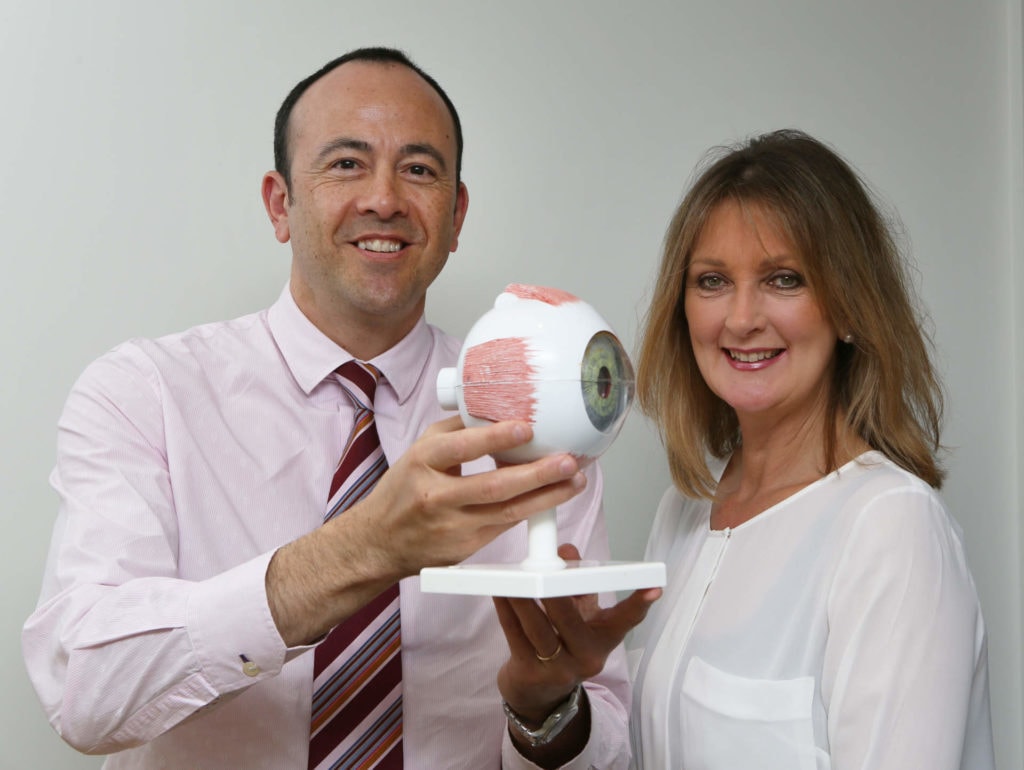Cataracts
Cataract is the medical term for a clouding, frosting or loss of clarity of the eye’s natural lens which can then have an impact on your ability to see clearly. Book a consultation today & find out if you’re suitable for cataract surgery.
600+ 5-Star Patient Reviews:


What is a Cataract?
A cataract is a clouding of the lens of the eye which gradually leads to worsening of vision, it is a natural ageing process. As we age the lens of the eye hardens and enlarges, this loss of flexibility first leads to difficulties viewing objects close to which is called presbyopia. As this progresses vision deteriorates further and cannot be corrected with glasses or contact lenses. As this process usually occurs slowly, many people believe that many of the symptoms they experience represent a normal decline of vision with age that is irreversible or that the world around them is changing e.g. headlights are becoming brighter. Many patients are delighted to discover that they can regain the vision they enjoyed earlier in life through cataract surgery.
The Basics

Let’s start by answering some of the most common questions.
What is the Lens?
Think of the lens as the human version of a camera lens. It is the part of the eye that helps to keep light focused on the retina. In early life it is soft and can change shape so that we can focus easily from long to very short distances. Made of a jelly-like proteins the importance of the lens and the cornea in front of it is to ensure that your retina receives as sharp and clear an image as possible.
How does the lens change with age?
As our eyes age, the lens of the eye loses flexibility so that our vision may focus clearly for distance but struggle to focus on objects close to. Most commonly, this results in the use of reading or varifocal glasses. Laser vision correction e.g. PRESBYOND® is another alternative to wearing reading glasses if cataract is not present. As the lens continues to stiffen slowly with age, loss of clarity of the lens eventually follows.
What is Cataract Surgery?
As our eyes age, the lens of the eye loses flexibility so that our vision may focus clearly for distance but struggle to focus on objects close to. Most commonly, this results in the use of reading or varifocal glasses. Laser vision correction e.g. PRESBYOND® is another alternative to wearing reading glasses if cataract is not present. As the lens continues to stiffen slowly with age, loss of clarity of the lens eventually follows. You can learn more about cataract surgery here.
More FAQs
Cataracts are largely due to ageing but can be caused or worsened by medical conditions e.g. diabetes, certain drugs e.g. corticosteroids or trauma. Rarely genetic conditions can cause cataract and some children are born with cataracts called congenital cataract. Some eye conditions can also limit the outcome of surgery e.g. if macular degeneration or glaucoma are present, so we will perform a comprehensive eye examination at your consultation prior to surgery so that you can make a fully informed decision about your care and make a fully informed choice.
The main symptom of cataract is loss of the ability to see fine detail. Struggling to see sub-titles on tv, requiring more light when reading, losing interest in reading because of lack of clarity of print are all typical of early change. Cataracts tend to shift our colour perception as they filter out blue / white light causing a shift in spectrum toward creams and browns. Glare is caused by the lens scattering light and this is often experienced as dazzle with on-coming headlights or with a low sun. These symptoms can make driving conditions harder and often result in people avoiding certain conditions e.g. driving at night, even when the legal criteria for driving can be met. Find those criteria here.
It’s up to you.
Cataracts do not need to become mature or ‘ripe’ before surgery is required as modern surgery is both safe and effective. You do not need to wait for an optician to tell you that your cataract is ready for surgery or that you have fallen below a certain visual standard before considering surgery yourself. As a rule of thumb, most people will seek surgery when cataract has an impact on their everyday life e.g. driving or reading. Certain types of cataract may require surgical intervention for medical reasons e.g. mature cataract or in cases of narrow iridocorneal angle but most people will chose surgery when they feel that they wish to see better than they currently do and cataract is the likely cause.
David Anderson is a dual fellowship accredited refractive cataract surgeon which means that we are able to offer a wide selection of lens types to suit your needs and the type of eyes you have. These range from astigmatism correcting toric lenses, extended depth of focus (EDoF) lenses e.g. the Symfony and AT Lara lenses and trifocal multifocal lenses e.g. AT LISA Trifocal and PanOptix lenses. David has been using specialist lens types for over 17 years and is an acknowledged expert in lens surgery. Depending on your examination and preferences, David can help to guide you to the best choice for your eyes.
Yes. Astigmatism is not a disease! It is an optical term to describe the way light is focussed by the eye. There are a number of options to treat astigmatism including the use of toric lens implants. David Anderson has published some of the largest studies on astigmatism in cataract surgery which can be referenced here:
Refractive lens exchange is the procedure of phacoemulsification performed before a cataract has formed so that a clear lens is removed. It is also called Clear lens Extraction (CLE) or lens replacement surgery. Please see our separate section on RLE.

